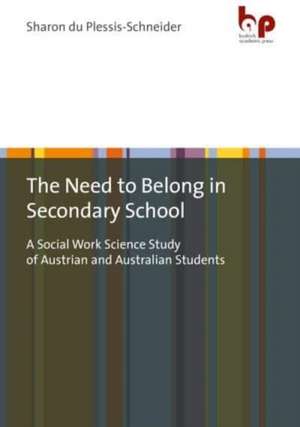du Plessis-Schneider, S: Need to Belong in Secondary School
Autor Sharon du Plessis-Schneideren Limba Engleză Paperback – 10 iul 2022
Preț: 555.49 lei
Preț vechi: 721.42 lei
-23% Nou
Puncte Express: 833
Preț estimativ în valută:
106.29€ • 110.76$ • 88.01£
106.29€ • 110.76$ • 88.01£
Carte tipărită la comandă
Livrare economică 03-17 aprilie
Preluare comenzi: 021 569.72.76
Specificații
ISBN-13: 9783966650458
ISBN-10: 3966650452
Pagini: 290
Ilustrații: Approx.
Dimensiuni: 147 x 208 x 17 mm
Greutate: 0.36 kg
Editura: Budrich Academic Press
ISBN-10: 3966650452
Pagini: 290
Ilustrații: Approx.
Dimensiuni: 147 x 208 x 17 mm
Greutate: 0.36 kg
Editura: Budrich Academic Press
Notă biografică
Sharon du Plessis-Schneider, MSW, is a lecturer at the University of Applied Sciences Vorarlberg in Dornbirn, Austria.
Cuprins
PART I: Research focus and theoretical framework
1 Introduction
1.1 Defining "belonging" and "need to belong"
1.2 Research problem
1.3 Aim and research questions
1.4 The conceptual framework
1.5 Summary and consequences for the research design
2 Needs, human rights, school social work
2.1 Austria: school social work
2.2 Australia: school social work
2.3 School social workers and human rights
2.4 Education, Bildung and didactics
2.5 Human rights framework for school Bildung and education
2.6 Austrian school education
2.7 Australian school education
2.8 Summary
3 Literature review on needs and student belonging
3.1 Children's needs, rights and wellbeing
3.2 Belonging as a psychological need
3.3 Interactions and social relationships
3.4 Membership as a determinant of belonging
3.5 Teachers fostering student belonging
3.6 Academic engagement
3.7 School environment
3.8 Heterogeneity and difference
3.9 Non-belonging and social exclusion
3.10 Summary
4 A conceptual framework based on theories of human need
4.1 Key concepts: theory, system and mechanism
4.2 Research on the historical perspectives of human need
4.3 Human needs and welfare science - Arlt, 1876 - 1960
4.4 Humanistic psychology and needs - Maslow, 1908-1970
4.5 Human needs in pedagogy - Mägdefrau, 1960
4.6 Biopsychic-social & cultural need theory - Obrecht, 1942
4.7 Synopses of human need across four need theories
4.8 Conceptualising the "need to belong"
4.9 Objections to human needs theories
4.10 Summary
PART II: Research design, data collection, analysis and findings
5 Research design
5.1 Ontology
5.2 Epistemology
5.3 Methodology
5.4 Case study
5.5 Observation
5.6 Focus groups
5.7 Ethical guidelines
5.8 Student voice
5.9 Characteristics of the research schools
5.10 Fieldwork at the school in Austria
5.11 Fieldwork at the school in Australia
5.12 Summary
6 The "need to belong" - the search for empirical evidence
6.1 Summarising the analyses as a methodological procedure
6.2 Individual student-based data analysis 6.3 Categories within four dimensions of belonging
6.4 Whole group analysis
6.5 Whole group analysis coding framework
6.6 Summary
7 Theoretical model and principles of general action
7.1 Theory model of the "need to belong"
7.2 Transdisciplinary knowledge in response to social problems
7.3 Principles of action: three-step transformative approach
7.4 Formulation of theoretical hypotheses
7.5 Formulation of action-theory working hypotheses
7.6 Formulation of general guidelines for action
7.7 Aligning the empirical findings with previous research
7.8 Summary
8 Findings and recommendations for the "need to belong"
8.1 Conceptual, theoretical, methodological contributions
8.2 Discussion of the individual student-based analysis
8.3 Discussion of the findings from the whole group analysis
8.4 Discussion of the transformative three-step approach
8.5 Reflections on the triple mandate of school social work
8.6 Heterogeneity facilitates student belonging
8.7 Suggestions for future research
1 Introduction
1.1 Defining "belonging" and "need to belong"
1.2 Research problem
1.3 Aim and research questions
1.4 The conceptual framework
1.5 Summary and consequences for the research design
2 Needs, human rights, school social work
2.1 Austria: school social work
2.2 Australia: school social work
2.3 School social workers and human rights
2.4 Education, Bildung and didactics
2.5 Human rights framework for school Bildung and education
2.6 Austrian school education
2.7 Australian school education
2.8 Summary
3 Literature review on needs and student belonging
3.1 Children's needs, rights and wellbeing
3.2 Belonging as a psychological need
3.3 Interactions and social relationships
3.4 Membership as a determinant of belonging
3.5 Teachers fostering student belonging
3.6 Academic engagement
3.7 School environment
3.8 Heterogeneity and difference
3.9 Non-belonging and social exclusion
3.10 Summary
4 A conceptual framework based on theories of human need
4.1 Key concepts: theory, system and mechanism
4.2 Research on the historical perspectives of human need
4.3 Human needs and welfare science - Arlt, 1876 - 1960
4.4 Humanistic psychology and needs - Maslow, 1908-1970
4.5 Human needs in pedagogy - Mägdefrau, 1960
4.6 Biopsychic-social & cultural need theory - Obrecht, 1942
4.7 Synopses of human need across four need theories
4.8 Conceptualising the "need to belong"
4.9 Objections to human needs theories
4.10 Summary
PART II: Research design, data collection, analysis and findings
5 Research design
5.1 Ontology
5.2 Epistemology
5.3 Methodology
5.4 Case study
5.5 Observation
5.6 Focus groups
5.7 Ethical guidelines
5.8 Student voice
5.9 Characteristics of the research schools
5.10 Fieldwork at the school in Austria
5.11 Fieldwork at the school in Australia
5.12 Summary
6 The "need to belong" - the search for empirical evidence
6.1 Summarising the analyses as a methodological procedure
6.2 Individual student-based data analysis 6.3 Categories within four dimensions of belonging
6.4 Whole group analysis
6.5 Whole group analysis coding framework
6.6 Summary
7 Theoretical model and principles of general action
7.1 Theory model of the "need to belong"
7.2 Transdisciplinary knowledge in response to social problems
7.3 Principles of action: three-step transformative approach
7.4 Formulation of theoretical hypotheses
7.5 Formulation of action-theory working hypotheses
7.6 Formulation of general guidelines for action
7.7 Aligning the empirical findings with previous research
7.8 Summary
8 Findings and recommendations for the "need to belong"
8.1 Conceptual, theoretical, methodological contributions
8.2 Discussion of the individual student-based analysis
8.3 Discussion of the findings from the whole group analysis
8.4 Discussion of the transformative three-step approach
8.5 Reflections on the triple mandate of school social work
8.6 Heterogeneity facilitates student belonging
8.7 Suggestions for future research
